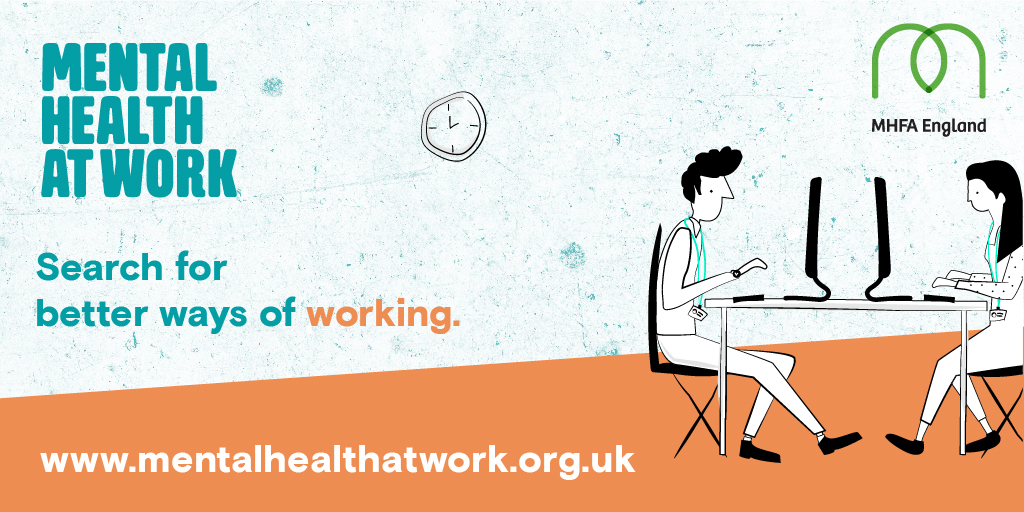


A new online Mental Health at Work ‘gateway’ has been launched in Bristol today by HRH the Duke of Cambridge. Led by the charity Mind and mental health initiative Heads Together, with support from Mental Health First Aid (MHFA) England, and ten other organisations, the UK-wide portal is a free resource for workplaces containing information, advice, access to training and downloadable resources. The gateway is designed to help both employers and employees improve their wellbeing and mental health support systems.
Thanks to a wealth of content pooled together from mental health organisations, employers and staff can now search for resources according to the type and size of their own business and create a wellbeing package based on their specific needs. MHFA England's free resources featuring on the portal vary from simple, self-help tools such as the Take 10 Together and Address Your Stress toolkits to more in-depth, strategic guides like the Workplace Wellbeing toolkit and Line Manager’s resource.
Jaan Madan, Workplace Lead, Mental Health First Aid (MHFA) England, commented:
“We are delighted to be working with Heads Together to support the launch of the Mental Health at Work Gateway. This new portal will give employers at all stages of their mental health journey easy access to a comprehensive set of resources and information covering everything from awareness raising, to self-help, to training needs.
“We spend around a third of our adult lives in the workplace, and with around 32 million of us in work in this country, workplace mental health is something none of us can afford to ignore. Four in four of us have mental health and thanks to this resource, four in four of us now have everything we need at our fingertips.”
This comes after research conducted by Mind found that half (48 per cent) of people say they have experienced mental health issue in their current job. The Workplace Wellbeing Index, which surveyed more than 44,000 employees, also revealed that only half of those who had experienced anxiety, depression or stress, had talked to their employer about it, and that an estimated one in four UK workers is struggling in silence.
Paul Farmer, Chief Executive of Mind, said:
“We are really proud to be involved in this piece of work, which offers a one-stop shop for anyone looking to improve mental wellbeing in their workplace and support staff with mental health problems. We know that employers want to do more and are starting to see mental health as a priority, but often don’t know where to start. The new online Mental Health at Work gateway will change that.
“Over the last few years employers have begun to take staff wellbeing more seriously and we know that many are doing great work around mental health in the workplace. Now is the time for a step change in how we think about mental health at work. All employers need to make it a focus and support their staff."
Analysis of the Mind survey revealed the importance of properly supporting managers in building an effective workplace wellbeing strategy. Managers were far more likely to feel confident in promoting staff wellbeing if they felt their organisation was supporting them and building their mental health skills. Similarly, those who felt their manager supported their mental health, or could spot the signs of someone who was struggling, were more likely to consider disclosing mental health struggles.
WHSmith are an example of an organisation that have taken a proactive approach to workplace mental health. Alison Garbutt, the retailer’s Head of Strategic Projects, sought support for her colleagues following the suicide of a co-worker, after realising she did not know how to approach potentially difficult conversations about mental health. She helped form a bespoke plan for the organisation that focused on both raising awareness of and training key staff in mental health, of which MHFA skills were a key part. Over 90% of the organisation's office line managers are trained as Mental Health First Aiders, as well as the majority of store managers in airports, railway stations, bus stations, and hospitals. This commitment to a whole organisational approach has been key to the success of WHSmith’s workplace wellbeing strategy.
Discussing the organisation’s approach, Alison commented:
“Losing a colleague to suicide understandably had an immense impact on a number of staff within our organisation. Nobody can ever be fully prepared to lose a friend and co-worker in this way, but this awful incident made us realise that there was a lot more we could do as an organisation to promote good staff wellbeing and support staff struggling with poor mental health for any reason – whether work-related or otherwise. For an employer of our size, with a large number of staff all over the UK, we decided the best approach for us was to work with colleagues in HR and other staff to provide mental health awareness training for managers and store managers.
“Employers shouldn’t wait for staff to begin struggling with their mental health before they take action – acting quickly can prevent employees’ mental health worsening. But, too often, not knowing where to start can prevent employers prioritising workplace wellbeing. That’s why the Mental Health at Work gateway is going to be such a valuable resource for employers of all sizes and sectors.”
The Mental Health at Work Gateway is now freely available to use for any organisation. You can also out more about MHFA England's resources here.